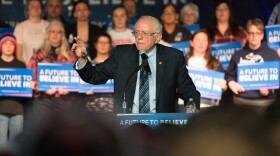Eight years ago, I was writing an article, and called Senator Bernie Sanders’ office for some information. The senator himself called back a couple hours later, and talked to me for 15 minutes or so.
He wasn’t nationally famous then; he was a political independent from a state with half the population of Michigan’s Oakland County.
You could have made a lot of money in Las Vegas a year ago had you bet on him to win this year’s Democratic primary in Michigan.
But win it he did.
Michigan was the only major industrial state among the 22 Sanders won this year. But he fell short of the nomination, and was decisively defeated Tuesday in New Jersey and California, the final two states to vote.
Within hours, there were two sets of reactions to the essential end of the primary campaign, and both were, in my opinion, dead wrong.
Most in the “mainstream” media, where you now need a new headline every thirty seconds, complained that Sanders didn’t instantly bow out of the race and endorse Hillary Clinton.
One Detroit Free Press columnist said he was displaying a “Neanderthal sensibility” and essentially accused him of sexism.
On the other hand, there are those vowing to never give in.
One progressive mathematician wrote “I know that I’m not voting for Hillary Clinton under any circumstances. I’ll write in Bernie Sanders. I urge others to.”
Well, it’s time for a grip and a little perspective.
Bernie Sanders came out of nowhere this year, raised more money than anyone ever imagined from small donations and did astonishingly well, even though virtually the entire Democratic establishment was against him.
By the time all the absentee votes in California are counted, he will have received more than twelve and a half million votes nationwide. But Hillary Clinton got sixteen million.
She won, fair and square.
For Sanders and his supporters not to endorse her would amount to an endorsement of Donald Trump.
But demanding he end his campaign instantly is also unfair.
If you listened to his speech the other night, what he was really saying is that he intends to go on fighting for his issues at the convention in Philadelphia.
Presidential nominating contests are about more than an individual candidate; they are, or should be, about what a party stands for.
Sanders has defining issues, including a $15 an hour minimum wage, and wants to push the nominee and the party into embracing them. Nothing wrong with that.
By the way, here’s some good advice from another candidate who lost a tough nomination battle.
“When he asked what he needed to do to convince my supporters to join his campaign, I said he’d need to give them time, but a genuine effort to make them feel welcome would persuade the vast majority to come around. If I could shift from doing my best to beat him to do doing everything I could to elect him President, so could they. Eventually, almost all of them did.”
That was what Hillary Clinton wrote in her book Hard Choices about her conversation with Barack Obama eight years ago, when she lost the nomination.
By the way, it took her five days after the final primaries to concede. Sometimes, you just have to wait for your latest tweet.










